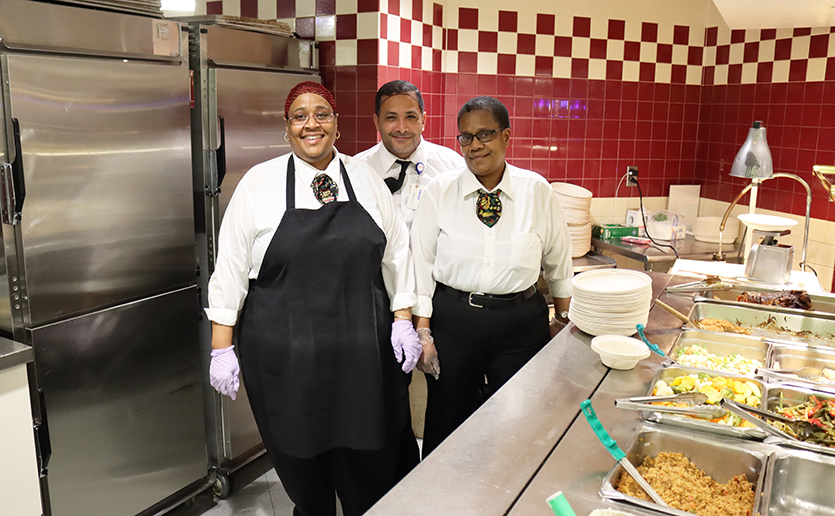Massachusetts General Hospital has teamed up with the Cambridge-based organization Food for Free to donate excess food from its largest cafeteria to help provide nutritious meals to people in the greater Boston area experiencing food instability.
“The last thing we want is to see food wasted,” says Sara Swiatlowski, manager in Retail and Revenue Operations for Mass General’s Eat Street Café. “Having the opportunity to work with Food for Free allows us to give back to the community and provide a healthy meal for those in need. This is a great program and we are happy to be working with them to help eliminate food insecurities.”
Since its inception, Mass General has been deeply committed to caring for communities.
Since its inception, Mass General has been deeply committed to caring for communities. It’s written into the hospital’s founding documents: “When in distress, every man becomes our neighbor.” Mass General’s investments in and support of community care, global health and public health have yielded innovative new strategies for addressing some of the most complex issues facing people in New England, across the country and around the globe.
Excess Food and Projections
Mass General Nutrition and Food Services staff – including chefs, dietitians and purchasers – forecast how much of each item should be prepared at Eat Street Café, located on the hospital’s main campus. Much like meteorological forecasting, however, these projections can change in an instant. Snow or rain may cause more employees to stay indoors and eat in the cafeteria, fewer patients may have appointments on a given day, or a new food offering might be less popular than expected. With an average of 3,000 meals served daily at Eat Street, even the slightest change can have a large impact on the amount of excess food left at closing time.

• Recovery Coach Helps Others Find Health and Hope
• Mass General Opens Gun Violence Prevention Center
• Health Policy Advocates on the March for Patients
• Physician Sees Health Effects of Climate Change
Due to strict food safety regulations and requirements, surplus food traditionally had to be discarded and could not be donated to food banks or even given to employees. Joan Shea, director of Nutrition and Food Services, says the department is always actively investigating ways to play a role in the hospital’s ongoing sustainability efforts and was thrilled to partner with Food for Free in November.
“We had been looking for a while to collaborate with an organization to help us minimize food waste, give back to the community and serve our neighbors and patients outside of our walls,” says Ms. Shea. “The program is different from others previously explored by Nutrition and Food Services – Food for Free ticks all of our boxes.”
Delicious and Nutritious Meals
Ms. Shea says an added benefit is the ease with which the program operates, as there is minimal labor associated with the donation preparation. The only changes to the Mass General kitchen workflow are the additional 20 minutes for one employee to place the food in a blast chiller overnight, then pack it into 2-quart plastic bags, which are placed into recycled banana boxes. These boxes are plentiful given that 360 bananas are delivered to the hospital on a daily basis, Shea says.
Food for Free sends a refrigerated truck once a week to the loading dock to transport the leftover food from the Carvery station to their kitchen where it is processed, portioned and matched with other donations to ensure delicious and nutritious meals for the recipients.
“It’s quickly become part of our culture and people are proud to contribute to a cause as noble as Food for Free.”
Ms. Shea says there are plans to expand the project to include items from other food stations at Eat Street Café, and they also are looking to donate surplus items from the patient food and catering offerings.
Contributing to Sustainability
“It’s been extremely rewarding to see the Nutrition and Food Services staff be so enthusiastic about getting involved in this program,” says Ms. Shea.
The collaboration involving excess food is just one way that Mass General continues to advance its sustainability efforts. For years, the cafeteria has worked with Agri-Cycle, an organization that converts the hospital’s compostable food waste into electricity, fuel and fertilizer. Recently, an ADA-compliant water bottle filler was installed in Eat Street Café and plans call for more stations to be added in the near future.
“It’s quickly become part of our culture and people are proud to contribute to a cause as noble as Food for Free,” says Ms. Shea.
To learn more about how you can support community health programs at Mass General, please contact us.
This story was first published in MGH Hotline, a publication for employees and staff of Mass General.

